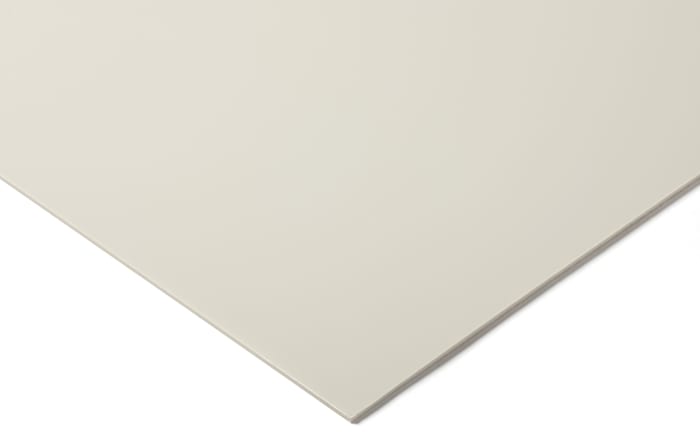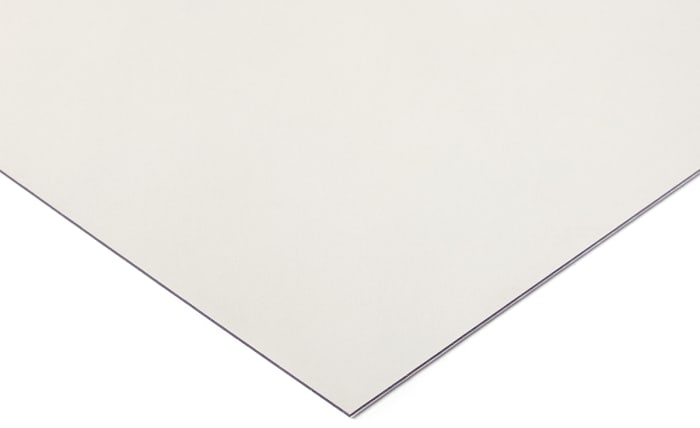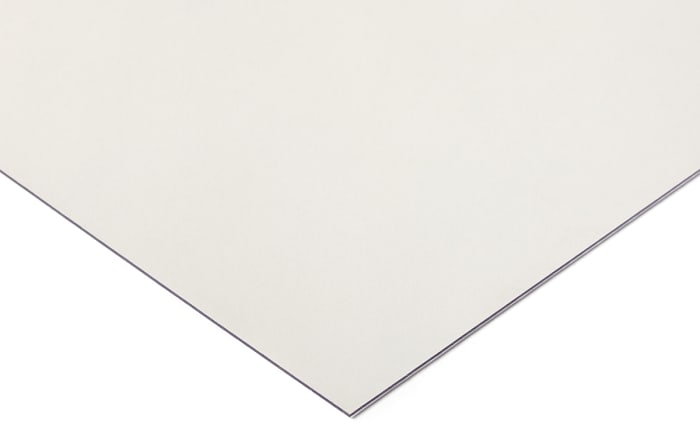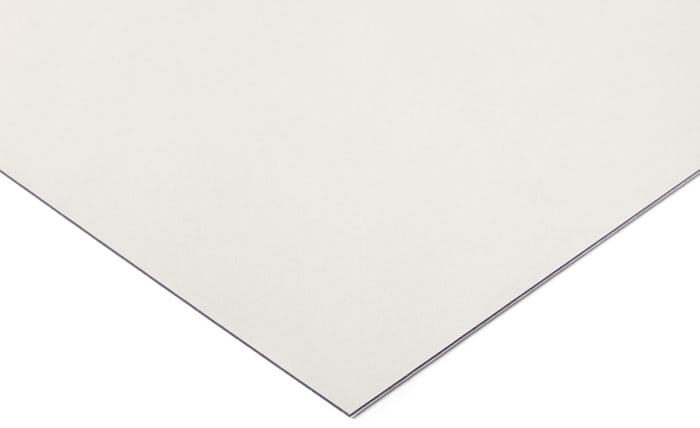RS PRO Clear Plastic Sheet, 1250mm x 610mm x 5mm

Technical Document
Specifications
Brand
RS ProColour
Clear
Form
Full
Length
1250mm
Width
610mm
Thickness
5mm
Material
PC
Laminated
No
Density
1.2g/cm³
Tensile Strength
62 MPa
Hardness
R 118 Rockwell
Flammability Rating
UL 94 HB
Water Absorption
0.35%
Maximum Operating Temperature
+120°C
Elongation
70%
Country of Origin
United Kingdom
Product details
RS Pro Polycarbonate Translucent Solid Plastic Sheets- PC Sheet : Polycarbonate
From RS Pro a range of high-quality polycarbonate translucent solid plastic sheets available in a range of sizes and thicknesses.
What are Solid Plastic Sheets?
Solid plastic sheets are sheets of strong durable plastic or plastic like materials which are cut to size and sold in a wide range of sizes and thickness. These hard plastic sheets, once purchased, can then be cut or machined into components for the fabrication of products for use in a wide range of industries. Different plastics have different properties which lend them for use in specific applications
What is Polycarbonate?
Polycarbonate is also known by the abbreviation PC and is a transparent amorphous engineering thermoplastic. Amorphous is the term given to plastics that gradually soften rather than go from a solid to a liquid when heated. Having this property means that this plastic is less likely to warp when subjected to high temperatures and easy to mould and thermoform. Polycarbonate is very tough with excellent impact resistance but also lightweight, very pliable and can be moulded and formed at room temperature without cracking or breaking. This clear sheet plastic is often used as a substitute for sheet metal if transparency or a non-conductive material is needed. One of the drawbacks with PC plastic sheet is its low scratch resistance so an additional hard coating needs to be applied where a scratch free surface is required
Features and Benefits
• Excellent impact strength
• Excellent dimensional stability with a high capacity to maintain its original dimensions when subjected to changes in temperature and humidity
• Rigidity over a wide range of temperatures
• Pliable and flexible
• Moderate chemical resistance and low solvent resistance
• Translucent
• Good heat resistance
• Good insulation properties
• Good machinability
• Easy to polish, weldable and bondable using glue
Applications
Polycarbonate plastic sheeting with its unique qualities especially it’s toughness and flexibility is suitable for use in a wide range of industries. These industries include the electronics, semiconductors, automotive, food, medical and construction industry. PC is a very versatile plastic and is ideally suited for applications requiring transparency and high impact resistance. The light weight of this clear and durable solid plastic sheeting compared to glass means also means it can be used as a glass replacement in some applications
• Medical devices
• Electronic components
• Automotive components
• Electrical cases and covers
• Digital Disks (CDs, DVDs, and Blu-ray)
• Machine guards and protective screens
• Signage and displays
What tools can be used to cut this plastic sheet?
The choice of tools used to cut this plastic depend on the thickness of the sheet being cut. Thin sheets of plastic can be cut using a sharp utility knife. Thicker sheets can be cut using a range of different types of saw such as a fine toothed hand saw or hacksaw or an electric table saw, band saw, circular saw or jig saw. The teeth on the saw blade should be well sharpened and evenly spaced out with a uniform height and shape to avoid cracking or chipping the plastic. The friction caused by sawing can cause the blade to heat which can melt the plastic therefore using a ’no-melt’ blade is recommended. If using a regular blade, it is an idea to pause between cuts to allow the blade to cool.
Stock information temporarily unavailable.
Please check again later.
€ 126.08
€ 126.08 Each (ex VAT)
€ 150.04
€ 150.04 Each (inc. VAT)
1
€ 126.08
€ 126.08 Each (ex VAT)
€ 150.04
€ 150.04 Each (inc. VAT)
1
Buy in bulk
| quantity | Unit price |
|---|---|
| 1 - 2 | € 126.08 |
| 3 - 9 | € 119.03 |
| 10 - 29 | € 114.33 |
| 30+ | € 105.51 |
Technical Document
Specifications
Brand
RS ProColour
Clear
Form
Full
Length
1250mm
Width
610mm
Thickness
5mm
Material
PC
Laminated
No
Density
1.2g/cm³
Tensile Strength
62 MPa
Hardness
R 118 Rockwell
Flammability Rating
UL 94 HB
Water Absorption
0.35%
Maximum Operating Temperature
+120°C
Elongation
70%
Country of Origin
United Kingdom
Product details
RS Pro Polycarbonate Translucent Solid Plastic Sheets- PC Sheet : Polycarbonate
From RS Pro a range of high-quality polycarbonate translucent solid plastic sheets available in a range of sizes and thicknesses.
What are Solid Plastic Sheets?
Solid plastic sheets are sheets of strong durable plastic or plastic like materials which are cut to size and sold in a wide range of sizes and thickness. These hard plastic sheets, once purchased, can then be cut or machined into components for the fabrication of products for use in a wide range of industries. Different plastics have different properties which lend them for use in specific applications
What is Polycarbonate?
Polycarbonate is also known by the abbreviation PC and is a transparent amorphous engineering thermoplastic. Amorphous is the term given to plastics that gradually soften rather than go from a solid to a liquid when heated. Having this property means that this plastic is less likely to warp when subjected to high temperatures and easy to mould and thermoform. Polycarbonate is very tough with excellent impact resistance but also lightweight, very pliable and can be moulded and formed at room temperature without cracking or breaking. This clear sheet plastic is often used as a substitute for sheet metal if transparency or a non-conductive material is needed. One of the drawbacks with PC plastic sheet is its low scratch resistance so an additional hard coating needs to be applied where a scratch free surface is required
Features and Benefits
• Excellent impact strength
• Excellent dimensional stability with a high capacity to maintain its original dimensions when subjected to changes in temperature and humidity
• Rigidity over a wide range of temperatures
• Pliable and flexible
• Moderate chemical resistance and low solvent resistance
• Translucent
• Good heat resistance
• Good insulation properties
• Good machinability
• Easy to polish, weldable and bondable using glue
Applications
Polycarbonate plastic sheeting with its unique qualities especially it’s toughness and flexibility is suitable for use in a wide range of industries. These industries include the electronics, semiconductors, automotive, food, medical and construction industry. PC is a very versatile plastic and is ideally suited for applications requiring transparency and high impact resistance. The light weight of this clear and durable solid plastic sheeting compared to glass means also means it can be used as a glass replacement in some applications
• Medical devices
• Electronic components
• Automotive components
• Electrical cases and covers
• Digital Disks (CDs, DVDs, and Blu-ray)
• Machine guards and protective screens
• Signage and displays
What tools can be used to cut this plastic sheet?
The choice of tools used to cut this plastic depend on the thickness of the sheet being cut. Thin sheets of plastic can be cut using a sharp utility knife. Thicker sheets can be cut using a range of different types of saw such as a fine toothed hand saw or hacksaw or an electric table saw, band saw, circular saw or jig saw. The teeth on the saw blade should be well sharpened and evenly spaced out with a uniform height and shape to avoid cracking or chipping the plastic. The friction caused by sawing can cause the blade to heat which can melt the plastic therefore using a ’no-melt’ blade is recommended. If using a regular blade, it is an idea to pause between cuts to allow the blade to cool.





